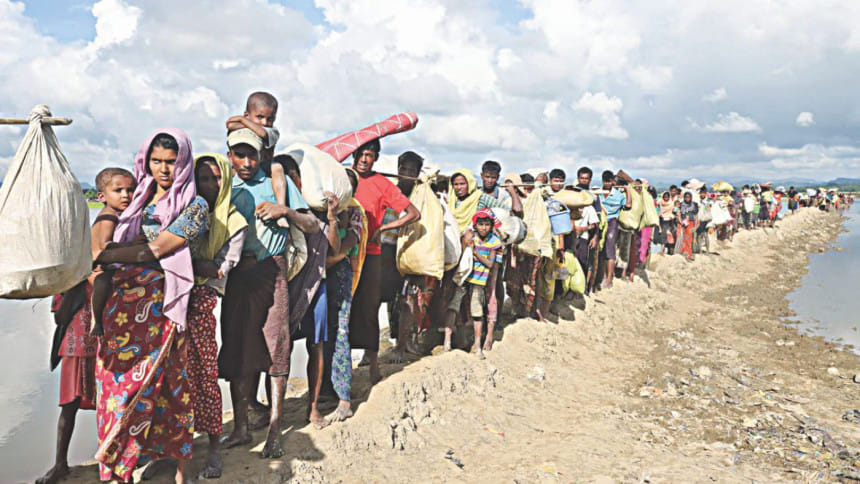UN needs reform

UN General Assembly should have the power to overrule the resolutions of the Security Council as it is failing to take actions necessary for global peace, Prime Minister's International Affairs Adviser Gowher Rizvi said yesterday.
"The United Nations has to retain its legitimacy. For this to happen, the UN General Assembly should be given the power to overrule the Security Council," he said.
Stressing the need for reforms in the world forum, Rizvi said, "Rohingya crisis is a clear manifestation of where the world stands today."
The UN permanent members are more concerned about their own national interests despite rising conflicts in various parts of the world, he added.
The observations came when over 5 lakh Rohingyas fled violence in Myanmar's Rakhine state to Bangladesh as Myanmar's security forces began a crackdown on Rohingyas after Rohingya insurgents attacked 30 police posts and an army base on August 25.
Rights bodies found evidence that Myanmar army burnt down over 200 Rohingya villages and killed hundreds of Rohingya men, raped women and forced them to flee to Bangladesh.
The UN termed it "textbook example of ethnic cleansing", while rights bodies accused Myanmar of genocide and crimes against humanity.
The UN Security Council, which could impose sanctions or authorise the use of force for peace failed to take any action because of opposition from China and Russia in a meeting in late September.
Such actions required unanimous passage of a resolution with no negative vote by any of its permanent members -- US, Britain, France, China and Russia.
Gowher Rizvi, who has worked in Oxford, Williams College in Massachusetts, Asia Society in New York, Ford Foundation and Harvard Kennedy School, said the UN had contributed a lot to make the world a better place, but it was still threatened by the dangers of wars, displacement, poverty and injustice.
"Therefore, reform in UN is absolutely necessary," said Rizvi at a seminar on the occasion of International Day of Peace jointly organised by Rotary International District 3281 Bangladesh and Bangladesh Institute of International and Strategic Studies (BIISS) at the latter's auditorium.
The UN is supposed to reflect united conscience of the world, but today's reality in the UN does not represent the conscience, he said, suggesting that the UN General Assembly should be given the power to overrule the Security Council's decision.
He said the system could be like a parliament where majority of the members have the final say on any decision made by the president. Such a system could truly reflect the representation of the world community, Rizvi added.
"Otherwise, we are in great danger," he warned. He also suggested expansion of the 15-member Security Council of UN, but did not elaborate.
He said the pressure from the international community on Myanmar authorities must continue until a solution was reached.
Academics and foreign relations experts at the seminar said the world was witnessing one of the biggest refugee and migrant crisis since World War II.
Delwar Hossain of the international relations department of Dhaka University said fragility in governance, social and economic injustice, priority of national and political interests by the governments lead to such conflicts.
According to the UN Refugee Agency, an unprecedented 65.6 million people around the world are displaced. Among them are nearly 22.5 million refugees, while there are 10 million stateless people denied of basic rights.
Bangladesh, despite not being a rich country, is dealing with nearly 9 lakh Rohingyas who are creating huge pressure on local resources.
Abul Hasan Chowdhury, former state minister for foreign affairs, suggested that Rizvi visit Beijing, New Delhi and Moscow to mobilise stronger support for a lasting solution to the crisis of the Rohingya, who are denied citizenship and other basic rights in Myanmar.
He suggested that Bangladesh deal with Myanmar on multilateral basis.
Lt Gen (retd) Md Mainul Islam said while peacekeeping is a critical role in conflict zones, global authorities need to address the root causes of such conflicts.
Rotary Club of Ramna President Air Cdre (retd) Ishfaq Ilahi Choudhury, BIISS Director General Maj Gen AKM Abdur Rahman, Rotary International District 3281 Bangladesh's District Governor FH Arif also spoke.

 For all latest news, follow The Daily Star's Google News channel.
For all latest news, follow The Daily Star's Google News channel. 





Comments